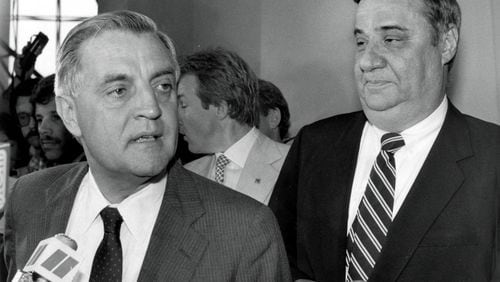Published Aug. 15, 2013
Bert Lance, the former state highway director who helped Jimmy Carter climb to the presidency and then joined his White House administration, died Thursday evening. He was 82.
State Sen. Jason Carter, the former president’s grandson, confirmed that President Carter was notified of Lance’s death within the last few hours.
Below is the top of the excellent advance obituary that my former AJC partner, Tom Baxter, wrote before he retired:
Bert Lance, who coined the phrase, “If it ain’t broke, don’t fix it,” advised politicians from Zell Miller to Jesse Jackson, and was director of the Office of Management and Budget under President Jimmy Carter, has died.
A self-described “country banker,” Lance became a protégé of Carter’s when the future president was a state senator, and encouraged Carter to seek the White House. Lance’s meteoric career in business and politics climaxed in the early months of the Carter presidency, when he was known as the “deputy president” because of his close relationship with his fellow Georgian.
The remainder of his life was spent under the cloud of a series of investigations that began with questions about the lending practices of his bank and ultimately forced his early departure from the OMB. He later claimed, on the basis of the 400,000 pages the Justice Department gathered about his banking practices, to be the most investigated person in the nation’s history.
Former New York Times columnist William Safire, who died in 2009, won a Pulitzer Prize for his columns about what he dubbed “Lancegate.” Safire later became a friend, and compared Lance’s legal ordeals in his book, “The First Dissident,” to the sufferings of Job.
“He will be remembered, first of all, as a lexicographer. He gained immortality with ‘If it ain’t broke, don’t fix it,’” said Safire, who attributed the phrase to Lance in his American Political Dictionary.
“More seriously, he was a guy who got up off the floor and made a life for himself after he left Washington, and hats off to him for that.”
Lance was the consummate insider, whether as a lay leader of the North Georgia Conference of the United Methodist Church or an adviser to international financiers.
“He was the kingmaker, rather than the king,” said former Gov. Roy Barnes, one of those who sought Lance’s advice.
Thomas Bertram Lance was born in Gainesville on June 3, 1931. His father, Thomas Jackson Lance, was an educator who held several positions across North Georgia, including the presidency of Young Harris College. Lance attended elementary school in Young Harris with Miller, the future governor and senator.
The family moved to Calhoun, where Lance met his future wife, LaBelle David , in the sixth grade. Her grandfather, a local banker, launched Lance, who came from a family of Methodist preachers and educators, in his profession.
After attending Emory University and the University of Georgia, 19-year-old Lance dropped out of college only one quarter shy of graduation to support his wife and son as a teller at the Calhoun First National Bank. He never earned an undergraduate degree, but leveraged his banking experience to take graduate-level banking classes at Rutgers University for three summers.
Within 12 years of taking the teller’s job at Calhoun, he was president of the bank and the force behind a successful effort to lure carpet manufacturers to his community from Dalton.
It was as a young man on his way up, Lance said later, that he met an old farmer named Ben Stone, whose words of wisdom became the material for many of the homespun lines he would later be identified with, including “If it ain’t broke, don’t fix it.” Dealing with customers at the bank, he said, taught him important things about people, about their financial concerns and their political aspirations.
“I’ve had so many failures that it’s unusual to talk about successes,” Lance said later in life. “But I would hope it could be said I had the ability to listen to people and understand what they were talking about.”
President Jimmy Carter issued the following statement this evening:
Bert Lance was one of the most competent and dedicated public servants I have ever known. As head of the Department of Transportation in Georgia, he was acknowledged by all the other cabinet level officials as their natural leader, and he quickly acquired the same status in Washington as our nation’s Director of the Office of Management and Budget.
Bert was one of the closest personal friends I have ever had, and was always a fountain of sound advice about the most detailed issues of our state and nation. His never failing sense of humor and ability to make thousands of friends were just two of the sterling qualities that made knowing Bert such a valuable part of our lives.
He and Labelle were a wonderful couple during their 63 years of marriage, and Rosalynn and I extend to her and their family our condolences, with the knowledge that they will be strengthened in this time of sorrow by their memories of wonderful times together.
About the Author








